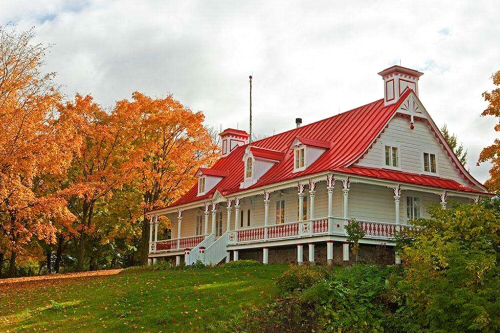Housing Markets: Maple Grief
住房市场:枫叶之伤
The lessons from Canada’s attempts to curb its house-price boom
从加拿大试图遏制房价上涨得来的教训
In matters of finance, if not climate, Canada is usually temperate. It was barely moved by the economic storms that blew the roof off America and Europe in 2008-09. Its banks were steady, it was argued, in part because they were shielded from the ferocious competition for market share that pushed banks elsewhere into hazardous loans. For all that, in its housing market Canada has lately become a place of extremes.
如果不谈气候,只论金融,加拿大通常是温和平稳的。2008至2009年爆发的经济风暴把美国和欧洲的屋顶都掀翻了,加拿大却基本没受影响。有人认为,加拿大的银行业之所以稳定,部分原因是它们没有加入争夺市场份额的激烈竞争,而这种竞争让其他国家的银行争相推出了高风险贷款。尽管如此,最近加拿大住房市场还是出现了极端情况。
Household debt has climbed to almost 170% of post-tax income. House prices rose by 20% in the year to April. Looked at relative to rents, they have deviated from their long-run average by more than any other big country The Economist covers in its global house-price index. In Toronto, one of two cities, along with Vancouver, where the boom has been concentrated, rental yields are barely above the cost of borrowing, even though interest rates are at record lows. In its twice-yearly health-check on the financial system, published in June, the Bank of Canada concluded that “extrapolative expectations” are a feature of the market. In other words, people are buying because they hope, or fear, that prices will keep rising.
家庭债务已经攀升至税后收入的近170%。从去年4月到今年4月,房价上涨了20%。从房价和租金的比率来看,加拿大的房价已偏离其长期平均水平,幅度超过《经济学人》全球房价指数所涵盖的其他任何大国。房价上涨主要集中在多伦多和温哥华这两个城市。在多伦多,租金收益仅略高于贷款成本,尽管利率处于历史低位。加拿大央行6月发布了一年两次的金融体系健康检查报告,得出结论称,目前住房市场呈现出“推定预期”的特征。换言之,人们买房是因为他们希望或担心房价会持续上涨。
Canada is not alone. House prices also look high relative to rents in Australia, where a few cities, notably Sydney and Melbourne, are booming. Prices in some American cities, such as Seattle and San Francisco, have been rising much faster than the national market, which looks reasonably priced.
出现这种问题的不止是加拿大。澳大利亚的房价租金比看起来也很高,有几个城市(特别是悉尼和墨尔本)楼市火爆。美国全国楼市的总体定价看起来还算合理,但一些城市(如西雅图和旧金山)的房价涨幅远高于全国整体水平。
Common to all these cities are buyers from emerging markets, notably China, who have helped to drive a wedge between the price of homes and the local fundamentals of incomes and rental payments. They are willing to pay above the odds to secure a safe place for their savings. Though fairly small in number, their presence is enough to inflate bubbles.
这些城市都有一个共同点,那就是来自新兴市场的买家,特别是中国买家,拉大了房价和收入与租金支出这两个当地市场基本面之间的差距。这些买家愿意支付高价,为他们的储蓄找到安全的去处。虽然这些买家数量很少,但他们的存在足以吹大泡沫。
Canada’s housing market thus opens a window on a tragic flaw in the global economy. In only a few decades China has mastered the manufacture of high-quality goods. But it takes far longer to be able to manufacture safe stores of value. Instead, their affluent citizens seek out rich-country assets, including houses. This fundamental mismatch limits the ability of policymakers to stop bubbles from inflating.
加拿大的住房市场因而打开了一扇窗,让人们一窥全球经济中一个悲剧性的缺陷。短短几十年里,中国已然精于制造高质量的商品,但要打造出安全储存财富的渠道,需要的时间要长得多。中国的富裕公民转而寻求投资富裕国家的资产,房产正在其中。这种根本上的错配限制了政策制定者阻止泡沫膨胀的能力。

Raising interest rates, which stand at just 0.5% in Canada, might seem the obvious answer. The economy is recovering and the Bank of Canada’s deputy governor has hinted in June that rates might climb. But several rises in succession might be needed to cool the housing market and that would probably send the economy into recession.
加拿大的利率目前只有0.5%,提高利率似乎是明显的解决方案。加拿大经济正在复苏,6月加拿大央行副行长暗示利率可能会上调。但要冷却住房市场可能需要连续多次加息,而这又可能会使经济陷入衰退。
The authorities have instead attempted to deal with the problem at its source. Last summer Vancouver imposed a 15% tax on foreigners’ house purchases. The city’s property market has since cooled. But one effect of this extra tax has been to shift housing demand to other places, such as nearby Victoria, and to Toronto, where house-price inflation is above 30%. The province of Ontario imposed a similar tax in April, prompting fears of a price surge in Montreal. To improve the supply of rental properties, Ontario has also permitted cities to slap a tax on vacant homes. That will help, but it will not solve the problem. There are tentative signs that prices in Vancouver are reviving, suggesting that the tax there has only deterred foreign buyers temporarily. In any event, some foreign owners hope to settle in Canada soon, and so will be entitled to claim a rebate.
当局转而试图从源头上解决问题。去年夏天,温哥华开始对外国人购房加征15%的税,楼市自此已经降温。但这种额外征税的一个影响是令购房需求转移到了其他地方,比如附近的维多利亚以及多伦多。多伦多的房价涨幅已超过30%。安大略省在4月开征了类似的税收,又引发了蒙特利尔房价暴涨的担忧。为了增加出租物业的供应,安大略省还允许各市对空置住宅征税。这类征税措施有助于缓解楼市压力,但治标不治本。初步迹象显示温哥华的房价正在复苏,表明税收政策只是暂时让外国买家却步。无论如何,有些外国业主希望很快在加拿大定居,所以未来有权要求退税。
There is no fail-safe administrative tool for curbing house-price booms. The best course is to insure against the fallout from a house-price bust. Canada has been more active in this than most countries. People with mortgages above 80% of the value of the home on which it is secured are obliged to pay for insurance against default. The underwriting standards on such mortgages have been steadily tightened. Canada’s biggest banks have some protection against potential storms. They are highly profitable and exceed international benchmarks for capital.
遏制房价上涨没有万全的行政手段,最好的做法是防范房价泡沫破灭后的不良影响。加拿大在这方面比大多数国家更为积极。贷款额超过房屋总价80%以上的买家必须支付违约保险金。加拿大已稳步收紧了这类房贷保险的要求。最大的一些银行也已采取了保护措施防范潜在风险。这些银行利润水平高且超过国际资本基准。
下载:英文、中文版本








